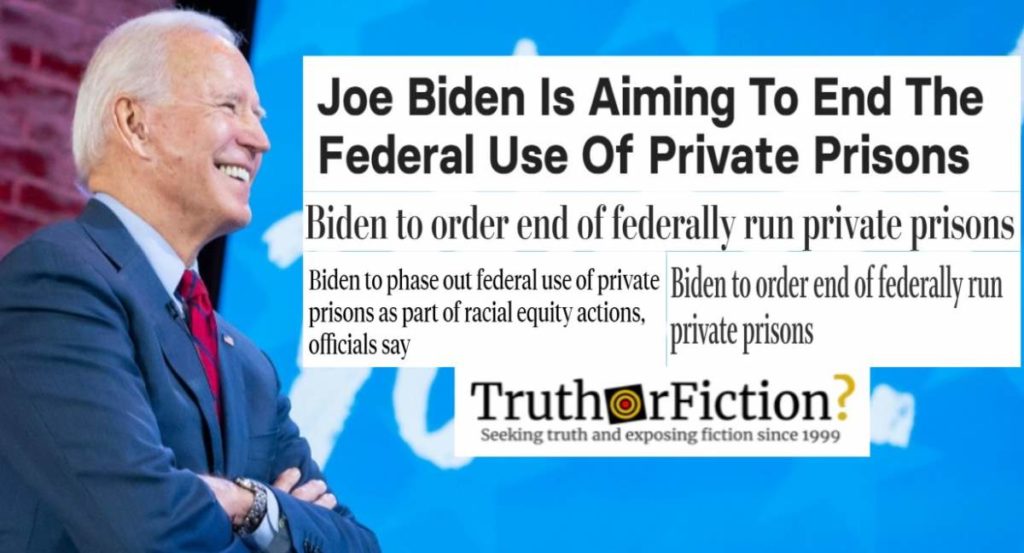United States President Joe Biden’s administration was set to fulfill one of his campaign promises on January 26 2021 — at least in part.
Biden was scheduled to sign an executive order instructing the Department of Justice not to renew its existing contracts with private prisons. However, as BuzzFeed reported, the order is not comprehensive:
During a White House press briefing on the new actions, domestic policy advisor Amb. Susan Rice said that the executive order would only apply to Department of Justice facilities and not to Department of Homeland Security facilities, like private [U.S. Immigration and Customs Enforcement (ICE)] detention centers. “It addresses the Department of Justice prisons in the first instance and is silent on what may or may not transpire with ICE facilities,” Rice told reporters.
According to the Federal Bureau of Prisons, 14,095 federal inmates — around 9 percent of the total federal prison population — were jailed in privately-run prisons at the time the executive order was announced.
Terminating federal contracts with privately-run prisons was part of Biden’s criminal justice platform, as stated on his campaign website:
Biden will end the federal government’s use of private prisons, building off an Obama-Biden Administration’s policy rescinded by the Trump Administration. And, he will make clear that the federal government should not use private facilities for any detention, including detention of undocumented immigrants. Biden will also make eliminating private prisons and all other methods of profiteering off of incarceration – including diversion programs, commercial bail, and electronic monitoring – a requirement for his new state and local prevention grant program. Finally, Biden will support the passage of legislation to crack down on the practice of private companies charging incarcerated individuals and their families outrageously high fees to make calls.
Nonprofit journalism organization The Marshall Project, which covers the criminal justice system, reported in November 2020 that Biden’s victory in the presidential election — and a drop in stock prices that preceded it — did not alarm the leadership at CoreCivic and Geo Group, the two companies powering the private prison industry in the United States:
That’s because they’ve been steadily diversifying, placing their bets on a future that includes revenue from commercial real estate, electronic monitoring, and halfway houses.
On a quarterly earnings call just two days after the election, CoreCivic CEO Damon Hininger was asked about the possibility that a Biden administration may end the company’s contracts with the Federal Bureau of Prisons. He replied confidently, “We think our risk is pretty minimal there.” He noted that back in 2010, the agency accounted for 15 percent of the company’s revenue. Today it’s just 2 percent.
As USA Today reported in December 2019, the private prison industry expanded dramatically while Biden’s predecessor, Donald Trump, was president:
At least 24 immigration detention centers and more than 17,000 beds were added in the past three years to the sprawling detention system run by U.S. Immigration and Customs Enforcement (ICE).
A USA Today Network investigation found that the companies operating those centers have generated record-setting revenue since 2016 while making record-setting political donations – primarily to Republicans, including Trump – as political figures moved freely between government policy roles and jobs in the private immigration industry.
The newspaper’s investigation found that “more than 400 allegations of sexual assault or abuse” and at least 29 deaths — seven by suicide — were reported in private facilities after Trump took office in January 2017.
Biden’s executive order will also not apply to private prisons contracted by state governments; the prisoner advocacy group the Sentencing Project reported in October 2019 that 22 states already do not work with those types of facilities.
- Joe Biden Is Aiming To End The Federal Use Of Private Prisons
- Joe Biden's Criminal Justice Policy
- Population Statistics
- Biden Will End the Justice Department’s Use of Private Prisons
- 'These People are Profitable': Under Trump, Private Prisons are Cashing In on ICE Detainees
- Think Private Prison Companies Are Going Away Under Biden? They Have Other Plans
- Biden Issued a Deportation Moratorium, but Immigration Advocates Raise Alarms About ICE Noncompliance
- Private Prisons in the United States

